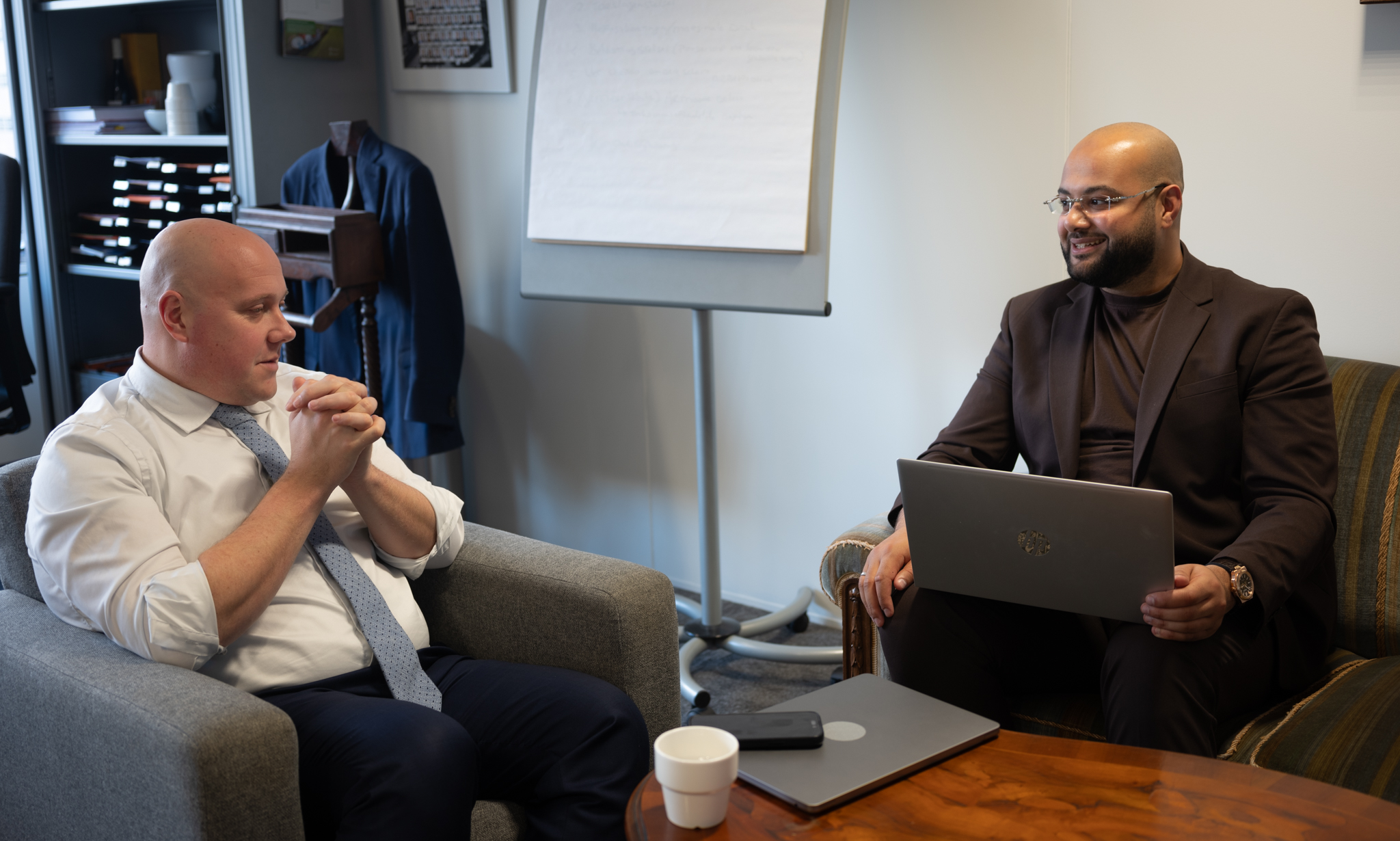With enormous enthusiasm, VVD Member of Parliament Thierry Aartsen has gorged himself on the zzp-dossier over the past year, and with good reason: for him, too, as a politician, the end of the enforcement moratorium as of January 1, 2025 and the criticism of the Council of State on the bill Verduidelijking Beoordeling Arbeidsrelatie (VBAR), among others, means that the labor market is moving at a new crossroads. According to him, it is therefore really time to start a fundamental discussion about the labor market and the position of self-employed workers in that labor market. In conversation with Oifik Youssefi, of the public affairs team at HeadFirst Group, Aartsen shares his views on the freedom for workers to make their own choices, the importance of political renewal and the future of the Dutch labor market.
Your political contribution is very well received by many a zzp'end. Are you the savior of zzp'end Holland?
These are very big words, but I am very committed to them. I always say: I'm in politics to build a bridge between entrepreneurs and politics. It is badly needed, because political The Hague often looks at the world differently than how it actually is. There are now more than 1.5 million self-employed people who want to decide for themselves how, what, where, when and why they do certain work. They want to organize their own working lives. What I see is The Hague trying to put this group of working people into a mold they don't want to be in. Don't get me wrong: I am against forced self-employment, but I am equally against forced employment.
To what extent does this issue characterize you as a member of the Chamber?
I am a liberal. Give people room to arrange their working lives themselves. To me it is important that we get this right for this group of people who also just pay taxes and work very hard. In addition, this group needs good political representation, and I notice that the discussion is quite misconstrued about zzp'ers. Critics often say that the self-employed are eroding the social system. By the way, you can have a good discussion about that with each other. But if that were true, which I doubt, then you should regulate that properly and not question the freedom of movement and starting motives of the self-employed. For my part, I am trying to contribute a little to the discussion by clearly representing the position of the self-employed and putting their concerns in the spotlight in The Hague.
Politically, things got especially interesting starting in the summer, but how do you look back on the past year with regard to the zzp dossier?
It was a year of progress, but not without struggle. Indeed, before the summer, it was really quiet before the storm. As time passed, I caught more and more noises from zzp'ers about the expiration of the enforcement moratorium on January 1, 2025. Then, a week before the summer recess, I took the initiative to organize a roundtable discussion in the House of Representatives on this subject. After this roundtable discussion, on Thursday, September 5, things really broke loose and all my channels exploded with even more concerns and reactions from zzp'ers and clients. It is good that the zzp dossier is now more prominent on the political agenda. At the same time, we are really still in the early stages of our struggle: making sure that enforcement goes well by January 1, 2025. The fundamental discussion - that people are allowed to decide for themselves how they want to work - we are not yet conducting enough. That's the next step, as far as I'm concerned. And if we are going to have that discussion with each other, then of course the question of how we are going to organize this properly with each other, looking at taxation and the social security system, is also important.
You argued in one of your motions in September for a "soft landing" when the enforcement moratorium expires. What do you think that means?
Most importantly, the Tax Administration is going to enforce in a risk-oriented manner. This means focusing on obvious abuses such as forced self-employment and constructions with migrant workers working for low hourly rates. It is therefore also important that the Tax and Customs Administration and the Labor Inspectorate work together effectively. Furthermore, in the motion I also called for warnings to remain in place, and model agreements also remain effective. Those warnings are crucial to restore peace of mind among clients. Should an audit take place, you still have the chance to correct it neatly and adjust the situation. The model agreements also offer a certain amount of clarity after all, if you stick to them, of course. This will hopefully contribute to a soft landing. Finally, I must also be honest: for the past few years the VVD has been in government, and we also failed to fundamentally address this problem. Hence we are standing here now. While it is still possible, I want to make adjustments where possible. Not directly from 0 to 100.

In the responses you get from zzp'ers and clients, they will no doubt express concerns about enforcement on false self-employment, but what do you yourself expect the impact of enforcement in 2025 to have on the market?
I am optimistic. I think - and above all, I hope - that it will not be too bad. Working with the self-employed can and should be just fine. But I see the concerns growing more and more in the run-up to Jan. 1, 2025. So my appeal to clients is: keep your cool, stay calm and don't force people into salaried employment en masse (in short order). Don't use the lifting of the moratorium as an excuse to panic. Look at what can be done, arrange a job description neatly and in such a way that you can just keep working with self-employed people. Stick to the agreements you make with each other. I especially hope that we can keep that calm.
The Council of State has strongly criticized the VBAR and the More Secure Flexible Workers Act. In addition, the WTTA (admission system) and compulsory disability insurance for the self-employed have been postponed. Isn't the labor market package at risk?
Yes, absolutely. There is a huge lack of innovation, and that is precisely what is desperately needed. We have to fundamentally rethink the position of the self-employed and our labor market as a whole. We have to admit that flex has gone too far in some places. But fixed is also very much fixed, and we need to discuss that too. So about flex and permanent. The outline agreement mentions two laws: the WTTA and the VBAR. The VVD supports the WTTA. The outline agreement does state that 'the cabinet is free to continue with the VBAR'. That is different from going ahead and agreeing to it blindly. I, as the VVD, am highly critical of that VBAR. And not only the VVD, but many industry associations, zzp organizations and scientists with me. That is why I also asked the cabinet: consider splitting the law, then you can already start working on the legal presumption based on an hourly rate for the basis of the labor market. And compulsory disability insurance is just enormously complicated. As the VVD, we think the opt-out is very important. Without that opt-out, a compulsory regulation cannot come about as far as we are concerned. But we have to look beyond that. It is time for a modern approach that really supports the self-employed, without forcing them into a straitjacket.
In an earlier debate, you mentioned Belgium as an example. What specifically would you like to adopt?
The Belgian social system offers a better balance between freedom and responsibility. In Belgium, the entrepreneurship of the individual is also more central. Here in the Netherlands, when it comes to the self-employed, we get too bogged down in discussions about taxation and false self-employment, when we should be thinking much more fundamentally about the position of the self-employed, including the protection and responsibilities that arise from it. In Belgium you have more space and freedom to choose for yourself and the working relationship between self-employed and client is more clearly defined. At the same time, they take extra measures for sectors with low hourly rates and where the risk of vulnerable entrepreneurship is greater. I find these additional sectoral criteria logical and it prevents abuse.
In general, what do you think could be better in the Netherlands in terms of dealing with self-employed people?
The core is recognizing that there is a huge growing group of Dutch people who want freedom, who want to determine for themselves how they organize their working lives. We still try to deny that now by always referring to the labor law from 1907. In addition, we need to adapt our tax and social security system here to self-employment. If the argument is that the self-employed do not contribute enough to social security, say so honestly and have a discussion about it, but do not deprive them of their individual freedom to do business. The focus should also be on a separate legal form for the self-employed, something we have not yet seriously considered here. That way you can draw a clear dividing line between employees and the self-employed, without restricting them unnecessarily in how they organize their work. That is the innovation I see before me: clarity, freedom and a modern social system that fits the current labor market and is therefore also ready for the future.
What was your highlight this year?
The cabinet finally began to move toward a soft landing, and the House supported it. I was really happy about that, though.
And the low point?
The concerns of self-employed people I receive daily in my mailbox. That touches me very much. People who work hard and are now losing assignments because organizations no longer dare to take them on. That does strike me as a low point.
What are you looking forward to in 2025?
A fundamental discussion about how we deal with the self-employed. In recent years, politicians have not sufficiently succeeded in answering the question of how we want to deal with the self-employed in the labor market. We have left that question unanswered. We need to have a serious conversation about a contract-independent system. That is a nice dot on the horizon and an important goal for me. And finally, I look forward specifically to January 21. Then we as VVD will organize a townhall session on the future of the self-employed, together with our political leader Dilan Yeşilgöz. I think it would be great to talk to a large group of self-employed people about how they envision their future.
*This interview is part of a series, in which in recent weeks the Public Affairs team has interviewed several experts closely involved in issues surrounding the self-employed and the labor market. The series consists of six interviews, which will be published in the coming weeks.

Request a free consultation

Questions about this? Please contact us.
Sem Overduin
Public Policy & Affairs Manager
Sem.Overduin@headfirst.nl
Oifik Youssefi
Public Affairs Officer
Oifik.Youssefi@headfirst.nl
Maaike van Driel
Head of Legal
Maaike.vanDriel@headfirst.group
Thomas ten Veldhuijs
Senior Legal Counsel
Thomas.tenVeldhuijs@headfirst.nl
